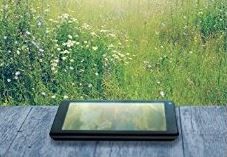Media
Discover the Joy of Missing Out
How to recover your balance in this crazy wired world.
Posted March 31, 2015

Have you got a sense that something is off with your life?
I have had that feeling for a while.
Back when this work I'm doing now (speaking, coaching, blogging, media) was just a dream, life was a grand creative adventure. I took writing courses, worked on my first novel (it's still in a drawer, I'm far better at writing non-fiction), toyed with a photography business, journaled daily, submitted articles and photos to travel magazines for fun, went out salsa and flamenco dancing a few nights a week and spent lots of my free time in gorgeous little cafes drinking tea and dreaming about an exciting, vibrant future.
During that wonderful, colorful season, I didn't have a cell phone. Email was a way of keeping in touch with distant friends and submitting articles to magazines I wrote for. I didn't have a blog or a website. Social media didn't exist. I used my computer to check email and write articles, and spent a ton of time reading real books. If I wanted to watch a movie, I went to the theater or ran out to the video store to rent something. I didn't have cable because I didn't want to give television the opportunity to hijack my life. Today's fully wired lifestyle snuck up on me so gradually I didn't see it coming.
Though I love what I do (and my past self would be thrilled to hear all that's happened in my life), I want to be that free person again. The one with all the creative space and inspiration. I had no phone to check when I was sitting out in nature or at a cafe. My mind could wander in my free time, no constant buzz to demand its attention. No constant buzz to escape into.
For a few months now I have been determined to get back to this state of openness and joyful creativity. Journalist Christina Crook's new book, The Joy of Missing Out: Finding Balance in a Wired World came along just in time. (And it's not just Christina who is writing about this, the movement has its own hashtag - #JOMO)
The book opens with a disturbing quote from Socrates:
"Beware the barrenness of a busy life."
Indeed.
Here are some of my favorite quotes from the book:
Kids experience joy all of the time, without knowing it...Statistics tell us that most of us are not living with this kind of joy; we are not living our very good days. Instead we are living in silos...spending the currency of our lives in front of MacBook Pros with retina displays, iPads and Androids...Our energies, creativity, and time—perhaps the best of us—are being spent committed to screens.
How would you describe the "best" of you? When do you feel most alive? How do you contribute the most to the lives of others? Are you embodying it, more days than not?
My best times used to be in the evenings. In those early days of my career I worked as a doctor in the daytime and my evenings were used to dream, create, play, connect and dance. I confess that too often now my evenings are spent relaxing in front of Netflix (ugh, did I just admit that?). I do get to do creative things in the daytime, as I'm blessed to earn my living from a collage of wonderful activities, but it's more work than play. That bubbling, joyful inspiration and creativity has been squashed, to a large degree, by electronic habits. I don't go out in the evening as much anymore, my life is much less interesting.
We are living in an upside-down world. Our wild, strong bodies are sedentary. Intimacy is down, and passivity and isolation are up. Our weak, needy hearts are lonely. We are anxious, tired, overwhelmed and addicted to technologies we don't fully understand, yet our culture has little to say about something we all feel.
I think it's a loss of wildness that I am mourning and longing to recover. Our lives used to be in-person, they used to be so much more alive. The technology, though amazing and wonderful in its ability to connect the world, isn't alive. We don't spend nearly as much time as we used to connecting with real people. We need real people, real connection. And real connection with ourselves, not just others.
As we slip further and further away from the fidelity of our design, the world has become complicated, and we have grown aimless and weary in the process. But we don't have to remain here; we can untangle the web, pull back the layers of our complicated 21st-century lives and chart a new course.
Crook's book does a marvelous job of examining where we've gone awry and how we might begin to take ourselves and our lives back, while acknowledging the reality and importance of our wired world.
In charting my new course, what helps most is to remember myself at my best at various times in my life—when I was happiest, when I felt most alive. How did I spend my time? What mattered? How did I view my days and my future?
Today, what would I long to spend my time doing, if anything were possible and I had no iPhone or computer?
What memories or insights do these questions bring up for you?
I have been recovering this information and reconnecting to my earlier, most authentic self through journaling (by hand, of course, in a gorgeous blank book). I encourage you to sit back, too, and reflect on what's alive in your life right now and what might have died as a result of today's nonstop wired lifestyle and habits.
I'll leave you with one last thought from the book:
We check email 18 times a day in the hope that one of those times we'll find an exciting message. What could we have been doing those other 17 times?
This is the question I'd love for you to answer, for yourself.
Dr. Susan Biali, M.D. is a medical doctor, health and wellness expert, life and health coach, professional speaker, flamenco dancer author. She is dedicated to helping people worldwide get healthy, reduce stress and enjoy more meaningful lives. Dr. Biali has been featured as an expert on the Today Show as well as other media outlets, and is available for keynote presentations, workshops/retreats, media commentary, and private life and health coaching.
Visit www.susanbiali.com to receive a complimentary Ebook: Ten Essential Easy Changes - Boost Mood, Increase Energy & Reduce Stress by Tomorrow.
Connect with Dr. Biali on Facebook and Twitter
Copyright Dr. Susan Biali, M.D. 2015




